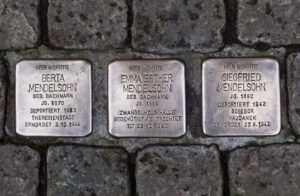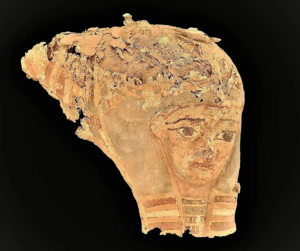The actor and director talked to Kveller about generational trauma, Holocaust humor and casting his own child in the film.
Lior Zaltzman
Lior Zaltzman is the deputy managing editor of Kveller.
Oct 31, 2024
It’s strange to say this about a Holocaust movie, but I left the press screening of Jesse Eisenberg’s film “A Real Pain” feeling happy and strangely grateful.
Like the Holocaust heritage trip that is at the center of the film, in a way, Holocaust movies often leave me feeling like there is a certain way I am supposed to feel about them, like I’m meant to leave with a kind of somber reverence. But the truth is that as the granddaughter of survivors, I grapple with the Holocaust and its aftermath in many ways on a regular basis, and that grappling is often messy and unclear. I don’t need a movie to spur on my ongoing big questions: What do I do with this legacy of pain? What kind of duties does it leave me, for myself and for the world?
What I love about “A Real Pain” is how utterly un-didactic it is, how much space it gives for a wide gamut of feeling. The two cousins it follows, David (Eisenberg), who is anchored by marriage, fatherhood and career, and Benji (Kieran Culkin), wandering and unmoored in life, are polar opposites in the way they deal with this trip. David is awkward, ill at ease and closed off, while Benji easily makes friends but is also prone to wild emotional outbursts. There’s also a diverse cast of characters traveling with them, each experiencing the trip in their own ways: a non-Jewish guide who is a history buff, a convert to Judaism who is himself a genocide survivor, Jennifer Grey as an older gorgeous woman from New York who is going through a personal upheaval, a married Jewish couple with deep American roots. The movie is both reverent and deeply funny in an effortless and unforced way that only a Jewish creator could manage — David and Benji’s banter is full of jokes that often hold in them more truth than their serious somber dialogue does.
The movie felt to me life a gift, the kind of Holocaust movie I’ve always wanted.
Can we ask?
It’s important to us to keep the warm, joyfully Jewish community on Kvelleraccessible for all. Reader donations help us do just that. Can you spare a few to keep Kveller free? (We’ll love you forever.)
https://youtube.com/watch?v=b2et8Vpu7Ls%3Ffeature%3Doembed
When I talk to Eisenberg in the midst of the High Holidays, I am not feeling the high I did after the movie. I am recovering from a daycare cold I caught from my son which had turned into pneumonia, and I’m struggling to get through my questions. But Eisenberg is as warm as the film itself. It’s not surprising for an actor who has made so many characters come so movingly alive throughout the years, from the troubled and troubling Toby of “Fleishman Is In Trouble” to journalist Dave Lipsky at “The End of the Tour” to young, lost Walt Berkman in “The Squid and the Whale,” all roles etched in my memory.
In the span of our short interview, Eisenberg is deeply thoughtful as he muses about his movie and refreshingly kind, telling me he hopes I feel better even though he knows I’ll get yet another daycare cold soon (and reminding me to get my flu shot in true Jewish parent fashion). We talk about the memories that have helped him, as a descendant of Holocaust survivors, connect to that painful history, as well as how humor functions as familial currency and why he chose to cast his own child as his onscreen progeny in “A Real Pain.”
This interview has been condensed and edited for clarity.
I love the movie so much. I felt really seen by it, as the granddaughter of survivors, and someone who has struggled with mental health. I really loved the way you mixed this heavy subject with humor. Why was that important to you, to make a movie about the Holocaust that is also profoundly funny?
Thank you for your reaction to the movie. It sounds like we are probably the same person, and I’m glad you weren’t put off by it.
My taste generally leans towards humor. That was like the currency in my childhood, to make friends and to get a word in edgewise with my family. You had to be funny, and that was prioritized, but we’re also serious people who contemplate bigger things. And so that’s what this movie is doing, in a way. It’s presenting this kind of funny and fraught relationship between these two cousins who have kind of grown apart, and presents their relationship in kind of a funny way. You can really put them in any situation, and you’ll see the contrast in a way that’s humorous, but they’re not stupid people, and they’re not uninterested people. They’re exploring the depths of their curiosity about their family history.
In the case of Kieran’s character, he’s trying to explore the visceral feeling of his family’s pain. He wants to feel the pain again. He struggles with his own demons and wants to connect to something greater. He doesn’t know where to place his demons now, because his life is relatively, materially safe, and so he struggles. And my character has just been this kind of medicated, controlled, obsessive, compulsive, generally anxious person, like I am, and is feeling also a lack of connection, a lack of meaning in his life. How is it possible that my life is so easy when other people’s lives are so difficult? And how can I try to scratch the surface of understanding it? That’s why they go on this trip, and that’s why the movie is funny, because this relationship is funny. And by the end of the movie, you know these guys so well that you’re laughing at just little looks they give each other, because you’re so aware of the way they differ.
I felt a lot of kinship with David. I mean, both of these characters are so wonderfully flawed and so wonderfully relatable. But as someone who’s been on a trip to Poland… It’s already kind of hard for him (and me!) to be a human in the world, and then to perform this “humanity,” if you will, in this heightened situation. I felt while on these trips to Poland an expectation to perform a certain kind of grief or connection that’s maybe sometimes hard to feel. Is that an experience you relate to?
Yeah, there’s something about doing a tour like this, where you’re expected to kind of debrief at the end of a day, or expected to lean on each other for comfort in moments of pain. What I liked about the character of Benji is that he doesn’t perform anything. He’s so in touch with his own feelings and so in touch with his own opinions that he could just say what people are thinking but not saying, and he kind of breaks open that tour group mold. The tour group mold being the one you’re describing, where people are kind of self-consciously trying to perform their own grief because it’s the appropriate thing to do. Benji doesn’t subscribe to those rules, and so he breaks open this mold in a way that feels to me both really scary, because it means he’s upending norms that we all agree upon, but also refreshing, because he’s kind of saying the stuff that I think a lot of us feel we wish we could say and just don’t have the brazenness to.
I was so struck by the scene at Majdanek, as someone who’s been there. Is it true that you’re the first film to shoot at that camp?
That’s what I’ve heard. It seems impossible to me, but maybe we are. Maybe we’re the first feature. I’m sure they let a documentary crew in, but maybe we were the first movie like this, which is kind of a straightforward American independent film, to go there.
It was a very quiet, poignant scene. What was behind the choice to show it that way?
The choice to show a very austere version of Majdanek was based on my wife’s and my trip in 2008 to Majdanek. We got there before it opened. It was a cold, foggy Polish morning, and when we walked in, no one was there. As you know from visiting yourself, Majdanek is either the real place, or a replica of the real place, with very little museum-ification, very, very little signage, very little pomp and circumstance. And so my wife and I were walking through, and we were alone, and it just gave me this feeling that I’ll never be able to shake, of feeling like I was a ghost walking through this purgatory of a place, feeling both this very powerful energy, while at the same time, a real emptiness.
And so I was trying to create that through imagery. We basically set up very simple shots. We didn’t tell the actors where the camera was. We told them, you’re just going to walk in here. Try not to stand in front of each other so we can see you, but don’t worry about lighting and just react as you would. And then we’re going to visit the gas chamber and just look inside and do whatever you would do. The actors understood the tone of the movie, so they knew I was not reaching for melodrama. That was just natural reactions to seeing these really dramatic places.
My feeling generally about Holocaust presentation in movies is, you have to just be as mature as possible. For example, “Son of Saul,” which is so explicit to me, is also a mature way to handle it, because it’s not pulling any punches. It’s just as viscerally uncomfortable as possible. And so with this movie, I wanted to have a simplicity, no soundtrack, just something that felt like an adult was filming these scenes.
So your real-life child, Banner, actually plays David’s child in the movie. Can you talk about that choice?
I had basically conceived of my character having a child so that Benji can feel a little bit like he’s been replaced, that my character has moved into adulthood at the expense of his cousin, and his cousin both resents him for it and loves him for it, loves his kid. I cast my own child mainly because I didn’t want to go through auditions of children, because it just seems like a horrific process to go through; I can’t think of anything worse than making kids audition for something. And so, you know, I just asked my kid. Of course, I’m being a little glib, because really, I wanted my kid to be in it, because it’s such a personal story. But it’s not just a movie for me. It’s really more of a touchstone and a kind of memory piece. And so I just wanted my kid to be in there, and they did such a great job.
They were so lovely. I loved those moments of David looking at these videos of his kid on his phone. I’m always the mom who’s looking at the videos of my kids the moment I’m away from them.
Exactly. Especially on a trip, you’re like, I miss my kid, I miss my kid.
What is the Holocaust lore that you grew up with, the moments that truly connected you to the story of the Holocaust?
So every few years, this woman would come to our house in New Jersey from Poland. Her name was Maria. She grew up in the house that we filmed the movie in. She was born in 1934. She was given to a Catholic family during the war; her brothers were shot in the cemetery in Krasnostav. Her parents were taken to concentration camps. And every time Maria was at our house, and I’m talking when I was 5 years old, there was this weight in the house that I didn’t understand. As I got older, I started to piece together a little bit more, but it was always strange. Her husband, Janek, didn’t really speak English, and so Maria and Janek were coming over, and I knew there was going to be a kind of feeling of heaviness in the air, and I wasn’t exactly sure why or what it meant.
It’s interesting now, as an adult looking back on it, what Maria must have been thinking. I became really close with Maria. My first play was called “The Revisionist,” and Vanessa Redgrave actually played Maria and it took place in her apartment in Chechen, in Poland. Maria told me a story of when she first came to America in the mid ’50s, after losing her entire family, and she saw my dad’s grandmother, who looked like her mother, and she said, “I just went in her lap, and I saw my mom’s face, and I couldn’t get out of my mom’s lap.” And I just cried and cried and cried.
My wife and I stayed with her in her apartment in Chechen. She never wanted to leave Poland. She was, in some ways, paralyzed by her story, and she passed of COVID in 2021, which seems so weird, just thinking of this person who survived [so much], including other horrors that I don’t want to get into now, and then died of COVID-19. It just feels like, my God, what a life.
Do you connect to the idea of intergenerational trauma, in relation to anxiety and mental health struggles? Sometimes I look at my son and see the same kind of pain echo in him and I think, oh, how do we stop this train?
It’s hard to… I’m not a very smart person to address this thought in any way other than through characters in a movie. But my mom used to wake me up in the middle of the night and say, “I had a dream that you were drowning. Go back to sleep.” So of course, I’m like, you know, up all night terrified, and I never learned how to swim. At the time, I was just like: Why does my mom keep saying this thing? It seems so bizarre. But I guess you can call that an example of intergenerational trauma, just this constant paranoia that life is a boat ride away from ending.
My dad’s side has been through so much tragedy, and I guess the feeling that life is losable is a kind of connective tissue, that things are not always stable, even when you feel they’re stable. I mean, my family really did feel a wonderful connection to Poland before the war. And so maybe there’s a feeling of destabilization. So they moved to New York, and maybe there was a feeling that New York could become unsafe for them.
But it’s not an exclusively Jewish experience. I’m friends with so many Polish people, especially older Polish people, who tell me, oh my God, after the war ended, it was Soviet. It was horrible. Even in doing my play “The Revisionist,” about this woman who stayed in Poland, we had a consultant. And they were telling us just horror stories of communist control. And so the experience of generational trauma is not exclusive to Jews. I try to remind myself that all the time, because I think it can become tempting to feel like your pain and history is so exclusively traumatic, when actually it’s probably far more common than, let’s say, the very comfortable experience of being an 8th generation Mayflower American who feels like the country has been made for them.




